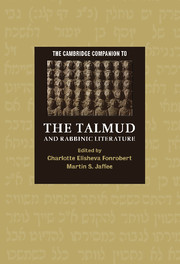Book contents
- Frontmatter
- Introduction: The Talmud, Rabbinic Literature, and Jewish Culture
- Part I: The Conditions of Rabbinic Literary Activity
- Part II: The Genres of Rabbinic Literary Composition
- 5 Rabbinic Midrash and Ancient Jewish Biblical Interpretation
- 6 The Judaean Legal Tradition and the Halakhah of the Mishnah
- 7 Roman Law and Rabbinic Legal Composition
- 8 Middle Persian Culture and Babylonian Sages: Accommodation and Resistance in the Shaping of Rabbinic Legal Tradition
- 9 Jewish Visionary Tradition in Rabbinic Literature
- 10 An Almost Invisible Presence: Multilingual Puns in Rabbinic Literature
- Part III: Hermeneutical Frames for Interpreting Rabbinic Literature
- Bibliography
- Index
- Source Index
- Series List
10 - An Almost Invisible Presence: Multilingual Puns in Rabbinic Literature
from Part II: - The Genres of Rabbinic Literary Composition
Published online by Cambridge University Press: 28 November 2007
- Frontmatter
- Introduction: The Talmud, Rabbinic Literature, and Jewish Culture
- Part I: The Conditions of Rabbinic Literary Activity
- Part II: The Genres of Rabbinic Literary Composition
- 5 Rabbinic Midrash and Ancient Jewish Biblical Interpretation
- 6 The Judaean Legal Tradition and the Halakhah of the Mishnah
- 7 Roman Law and Rabbinic Legal Composition
- 8 Middle Persian Culture and Babylonian Sages: Accommodation and Resistance in the Shaping of Rabbinic Legal Tradition
- 9 Jewish Visionary Tradition in Rabbinic Literature
- 10 An Almost Invisible Presence: Multilingual Puns in Rabbinic Literature
- Part III: Hermeneutical Frames for Interpreting Rabbinic Literature
- Bibliography
- Index
- Source Index
- Series List
Summary
Scholars of rabbinic literature are increasingly aware of the various ways in which the emerging culture of the sages was deeply in conversation with surrounding cultural currents. The essays by Seth Schwartz, Yaakov Elman, and Catherine Hezser in this volume already have pointed readers in this direction. In the present contribution, I wish to continue this theme from the perspective of linguistics and folklore studies. In particular, I shall focus on the expression of cultural proximity, maybe even intimacy, of the Aramaic and Hebrew-speaking Jewish culture of the Greco-Roman and Byzantine period with the Greek-speaking culture of the same time and place. The evidence I shall call upon is found in hidden puns relating to the Greek language that underlie some Aramaic or Hebrew texts. These demonstrate a marked interlingual proficiency and creativity on the part of the authors, narrators, and even their audiences. The traversing of linguistic borders that seems to have been regarded with aesthetic pleasure and cultural appreciation offers yet more demonstration that cultural isolationism was hardly a dominant trait in the culture that we call ancient rabbinic.
The texts in which I have found these puns are from rabbinic works, shaped between the third and the sixth century, approximately, in Jewish Palestine, texts in which the Hebrew Bible serves as a constant point of reference and basis for interpretation. Remarkably, maybe one could even say paradoxically, one important literary context in which such puns appear is the midrashic account of the historical clash between Judah and Rome in Lamentations Rabbah, a text that surely emerges out of this period, although in its later formations it was strongly influenced by the Babylonian Talmud.
- Type
- Chapter
- Information
- The Cambridge Companion to the Talmud and Rabbinic Literature , pp. 222 - 240Publisher: Cambridge University PressPrint publication year: 2007
- 1
- Cited by



